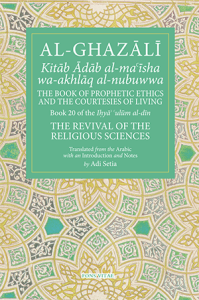Al-Ghazali The Book of Prophetic Ethics and the Courtesies of Living (Ihya Ulumuddin Series No. 20)

Author: Imām Al-Ghazali
Translator: Adi Setia
Publisher: Fons Vitae Publishing
Year of Publication: 2019
Print Length: 144 pages
Genre: Islamic Studies / Quranic Studies; Theology, Ethics and Philosophy; Islamic Law & Jurisprudence, Science; Qur’anic Reflection, Supplication & Prayers; Non-Fiction / Religious Studies
Topic: Prophet Muhammad ﷺ, Islam, Qur’an, Ethics & Morality, Lifestyle, Human Nature & Character
In book twenty of the forty books which compose the Revival of the Religious Sciences (Ihya’ ‘ulum al-din), Abu hamid al-Ghazali gives a full account of the customs and character of the Messenger of God, Muhammad. It is not a biography of Muhammad (peace and blessing of God be upon him) but a roadmap for those who want to strengthen their faith, increase their knowledge, and deepen their understanding of the second part of the testimony of faith, namely the first pillar of Islam. The author details the Messenger’s noble nature and his miracles, while removing doubts regarding his message. He deals with the issue of the imitation of Muhammad (peace and blessing of God be upon him) noting that the ultimate source of knowledge is revelation from God which comes to us through the Messenger. This volume lays clear that the aim of the imam in this series is to call for a return to the Sunna and the imitation of the Messenger in all aspects of life.
Table of Contents
Biography of Imām Al-Ghazāli
Preface
Foreword
Introduction
Translator’s Introduction
THE BOOK OF PROPHETIC ETHICS AND THE COURTESIES OF LIVING
Author’s Introduction
1. An Account of the Refinement by God Most High of His Beloved and Chosen, Muhammad
2. An Account of a Portion of His Nobilities of Ethical Character That Have Been Brought Together by Some of the Scholars and Assembled from the Reports
3. An Account of Some Other Aspects of His Comportment and Character
4. An Account of His Speech and Laughter
5. An Account of His Ethics and Comportment in Regard to Food
6. An Account of His Manners and Character in Regard to Attire
7. An Account of His Forgiveness Notwithstanding His Ability to Censure
8. An Account of His Averting of His Gaze from Whatever He Disliked
9. An Account of His Munificence and Generosity
10. An Account of His Bravery
11. An Account of His Humility
12. An Account of His External Manner and Countenance
13. An Account of His Miracles and Signs Indicative of His Truthfulness
Bibliography
Indices: Index to Qur’ānic Verses / Index of Ḥadīth / Index of People / Index of Places / Index of Subjects
About the Translator
About the Author of the Preface
About the Author of the Foreword
About the Author of the Introduction

Imām Abu Hamid al-Ghazali is a 11th century Muslim scholar. He was one of the most prominent and influential philosophers, theologians, jurists, and mystics of Sunni Islam. Al-Ghazālī was born at Ṭūs (near Mashhad in eastern Iran) and was educated there, then in Jorjān, and finally at Nishapur (Neyshābūr), where his teacher was al-Juwaynī, who earned the title of imām al-ḥaramayn (the imam of the two sacred cities of Mecca and Medina). He was active at a time when Sunni theology had just passed through its consolidation and entered a period of intense challenges from Shiite Ismâ’îlite theology and the Arabic tradition of Aristotelian philosophy (falsafa). Al-Ghazâlî understood the importance of falsafa and developed a complex response that rejected and condemned some of its teachings, while it also allowed him to accept and apply others. His great work, Iḥyāʾ ʿulūm al-dīn or Ihya Ulumuddin (“The Revival of the Religious Sciences”), made Sufism (Islamic mysticism) an acceptable part of orthodox Islam.
Source: https://plato.stanford.edu/entries/al-ghazali/
More from Imam al-Ghazali in this library, click here.

Adi Setia the founding director of IGE Advisory, which is dedicated to consulting, teaching and researching in the Islamic Gift Economy framework. He is also the co-founder of the Program for Ethical, Appropriate & Regenerative Livelihoods (PEARL).
Source: https://jis.cis-ca.org/adi-setia.html
More from Adi Setia in this library, click here.
